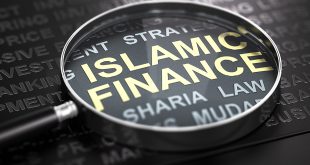Although the Islamic mode of banking is mandated and adopted by the Islamic Republics of Iran , Pakistan and Sudan, the supply of innovative Shari’a -compliant products has been primarily led by the private sector .In fact , private Islamic banks as a group are becoming some of the largest private -sector financial institutions , with growing networks through branches and or subsidiaries , within the Islamic World . There is no standard way of groping IFIs, but in terms of the services rendered ,today’s IFIs can be divided into the following broad categories:
*Islamic Banks;
*Islamic Windows;
*Islamic Investment Banks and Funds
*Islamic Mortgage Companies;
*Takaful Companies (Islamic Insurance Institutions);
· International Islamic Financial Markets (IIFM)
Islamic Financial Services Board (IFSB)
The Central Bank Governors of those countries where Islamic Banks operate , mainly in South -East Asia , the Middle East and North Africa , met to approve the establishment of anew International body , the Islamic Financial Services Board (IFSB) , to be based in Kuala Lumpur , Malaysia. It will have a role similar to that of the Basel Committee on Banking supervision in Conventional banking, for the regulation and supervision of Islamic Banking .The proposed establishment of a standard-setting body for introducing new or adopting existing international prudential standards for IFIs, is the result of the efforts of AAOIFI, the IDB, The IMF and the central banks of several Islamic Countries. The primary objective of IFSB is to develop uniform regulatory and transparency standards similar to Basel committee standards that are targeted to address characteristics specific to IFIs, keeping in mind the national financial environments , international standards , core principals ,and good practices . Whereas AAOIFI took the lead in defining regulatory standards .
Conclusion
To day the Islamic finance and banking industry according to the Financial Times , Over the past decade Islamic Banking is estimated to have grown more than fivefold from around $150 Billion in 1990 to $900 Billion in 2008 and growing at the rate of 15 per cent to 20 per cent a year and are set to hit $2 trillion in 2010.
Global Islamic Banking assets (based on the latest figures released by the Financial Times in 2008 November ) grew by 27.6 per cent over the past year to reach over $800 Billion from around 50 countries .Although this is relatively small compared with the $90,256 Billion in total assets amassed by the top 1000 conventional bank around the world. Analysing the $800 Billion global market, the six states of the Gulf Cooperation Council (GCC) ,Bahrain ,Kuwait,Oman ,Qatar ,Saudi Arabia and the UAE offer the largest portion of the total but the non GCC Middle East and north Africa (MENA) states are not far behind while the overall total grew by 27.6 per cent to $800 Billion in the listing the GCC institutions expanded the most by a staggering 47.5 per cent to $262.7 Billion and the non GCC MENA institution grew by 40.4 per cent to reach $248.3 Billion.
Asia , led by Malaysia , Brunei,Pakistan , Bangladesh, Indonesia and Thailand , is the largest region in the world for Shari’ah -compliant assets, growing by 32.3 per cent tp 119.3 Billion .Australia, Europe and North America grew by 60.6 per cent to account for $35.1 Billion with sub-Saharan African institutions contributing $4.7 Billion assets . Now Global banking giant such as America’s Citigroup, Britain’s HSBC and Germany’s Deutsche Bank have also established Shari’ah – compliant banking units.
Post Disclaimer | Support Us
Support Us
The sailanmuslim.com web site entirely supported by individual donors and well wishers. If you regularly visit this site and wish to show your appreciation, or if you wish to see further development of sailanmuslim.com, please donate us
IMPORTANT : All content hosted on sailanmuslim.com is solely for non-commercial purposes and with the permission of original copyright holders. Any other use of the hosted content, such as for financial gain, requires express approval from the copyright owners.
 Sri lanka Muslims Web Portal Sri Lanka Muslims News Center
Sri lanka Muslims Web Portal Sri Lanka Muslims News Center
 Donate
Donate


